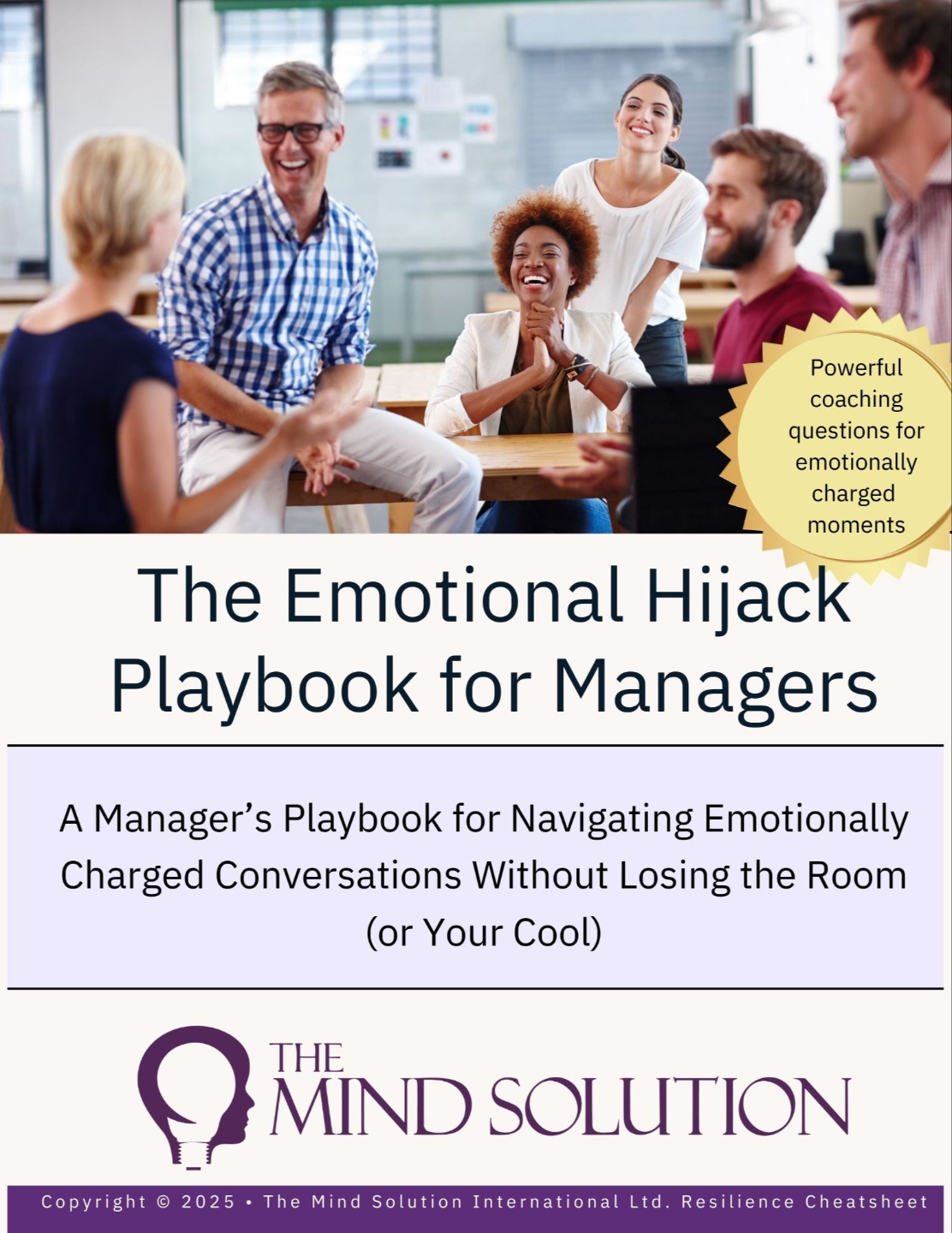How to Make Mental Health Training Stick
Aug 06, 2025
Why Is Mental Health Training Becoming Essential in Every Organisation?
Mental health training, mental health awareness training, and mental health training for managers are fast becoming staples on the learning and development calendars of many organisations, and rightly so.
More businesses are beginning to understand that mental health is not just a “nice to have” or a one-off initiative to roll out during World Mental Health Day. It’s an essential part of how we create high-performing, human-first organisations.
But the truth is, while it’s brilliant that more organisations are prioritising mental health, the real question is, how do you make that training stick? Because unless it's integrated, embodied, and reinforced, mental health training will struggle to deliver long-term impact.
What Do You Want to Achieve With Mental Health Training?
The first thing I always invite organisations to consider is: what are you trying to achieve?
Because when you say you want “mental health training,” that could mean any number of things. It could be focused on mental health conditions, the human psyche, neurodiversity, energy psychology, employee resilience, or leadership training. There’s no one-size-fits-all.
So what do you want people to walk away with? Is it simply awareness? Is it practical tools? A shift in mindset? A reduction in mental health stigma? All of the above?
We always start by understanding your organisation:
-
What’s happening on the ground?
-
What challenges are your people facing?
-
What training have you already delivered?
-
What feedback have you received?
Only then can we guide you on what will truly land and what your employees or managers need.
How Can You Narrow the Focus of Your Mental Health Awareness Training?
Because mental health is such a vast topic, narrowing your focus is key.
We’ve worked with countless organisations that came to us asking for mental health training, but weren’t exactly sure what that should include. And that’s understandable. Mental health isn’t one thing, it’s a spectrum.
If you’re a learning and development manager saying, “We just want people to have more awareness of mental health,” that’s a great starting point. But we then need to ask: what does that look like in your context? What are the real-world outcomes you’re hoping for?
This is where we help you clarify and shape the training. It’s not about throwing every mental health concept at your employees. It’s about delivering what’s most relevant and most useful.
What Makes the Inside the Mind Webinar So Impactful?
One of our most popular wellbeing webinars is called Inside the Mind, and the feedback we receive from this session is consistently exceptional.
Why? Because it gets to the root of what impacts mental health.
Inside the Mind gives your employees a deeper understanding of how the mind works, what creates thought, what creates feeling, and how these impact our experience of mental health. Because stress, anxiety, depression, even trauma and addiction, are byproducts. They are not the root cause.
When people can see how their internal world is being created, they gain power. They’re no longer at the mercy of their mind. They no longer believe that their experience defines who they are.
Can Thought Alone Influence Anxiety and Mental Health?
Take anxiety. Most people who experience anxiety are living in a constant loop of overthinking and worst-case scenario thinking. They catastrophise. They anticipate failure, loss, rejection, illness, or some disaster. It’s exhausting.
Many people believe they are anxious. That’s just who they are. Maybe they’ve been told that by a GP. Maybe they’ve even been medicated.
But what we do in our webinars is help people to see that anxiety is a thought-based experience. That it’s not the external situation causing the anxiety, it’s the thought they’re having about it.
And when someone realises, even momentarily, that a thought is just a thought—everything changes. That’s when hope emerges. That’s when people begin to see through the illusion of their thinking. They’re not destined to “cope” for life. They’re simply living in thought.
How Does EFT Tapping Support Lasting Change After Training?
We often follow up Inside the Mind with another high-impact session, our EFT Tapping Webinar.
In this webinar, we don’t just talk about tools; we demonstrate them live. Employees get to experience a somatic shift in the way they feel. We guide them through an Emotional Freedom Technique (EFT) tapping sequence, and they feel the difference—immediately.
The science behind EFT is compelling. It’s been shown to:
-
Significantly reduce cortisol (the stress hormone)
-
Rewire emotional patterns in the brain
-
Create calm in the autonomic nervous system
-
Release old traumas and energetic blockages
And the best part? It’s a tool they can use anytime, anywhere, without needing a therapist.
So now your employees aren’t just informed—they’re empowered.
What’s Different About Mental Health Training for Managers?
When it comes to mental health training for managers, the approach is different for making training stick. Why? Because the goals are more specific.
Organisations that invest in manager-specific training are usually looking for:
-
Greater confidence around mental health conversations
-
Awareness of what to say and what not to say
-
Clarity on legal frameworks like the Equality Act or ADA
-
Insight into spotting the signs that someone is struggling
-
Skills in listening and solution-focused communication
These sessions are about giving managers the tools, language, and mindset to proactively support wellbeing in their teams. They’re not expected to be therapists, but they are expected to hold space, listen, and respond appropriately.
How Can You Make Mental Health Awareness More Than a One-Off Event?
While many organisations choose to run mental health webinars during World Mental Health Day or Mental Health Awareness Week, one-off events aren’t enough.
Don’t get me wrong, awareness weeks are valuable. But they shouldn’t be the only time you talk about mental health.
Because here’s the truth: no matter how brilliant your webinar is, people won’t retain all the information from one session. And more importantly, change won’t happen in a single 60-minute presentation.
It’s not about having a great event. It’s about building a culture.
Why Is Repetition So Critical for Embedding Mental Health Learning?
Here’s what we know from neuroscience: for the brain to learn something new, it needs repetition. It usually takes 7 to 15 exposures to the same message before it begins to embed.
We know this in marketing. We know this in onboarding. And we need to apply the same principle to mental health training.
Whether it’s follow-up emails, access to an on-demand wellbeing platform, microlearning, or weekly nudges—repetition is how you rewire the brain. It’s how training sticks.
How Do You Build a Culture That Supports Ongoing Mental Health Awareness?
Beyond the training itself, what makes mental health truly stick is the culture.
-
What language is being used across your organisation?
-
Are your leaders role modelling openness?
-
Do your values reflect psychological safety?
-
Are people encouraged to take mental health days?
-
Is vulnerability met with support—or silence?
Because mental health isn't just a policy or a programme. It’s how we relate to each other. It’s how we respond when someone’s struggling. It’s what we normalise.
How Do Real Human Experiences Affect Mental Health at Work?
Let’s also get real, life is going to happen.
We’re going to experience grief, breakups, burnout, physical illness, parenting struggles, caring for elderly relatives, redundancies, financial stress, global events, wars—the list goes on.
All of these affect mental health. Not because people are weak, but because they’re human.
So if your workplace doesn’t make space for humanity, you’re setting people up to fail. And eventually, that shows up in absenteeism, presenteeism, disengagement, and turnover.
Why Kindness, Vulnerability and Compassion Matter in Mental Health Strategy?
At the heart of everything I’ve seen work—from training sessions to cultural shifts—is one word: compassion.
- We need managers who are willing to say, “I’m not okay right now.”
- We need teams where it’s safe to talk about hard things.
- We need kindness in our day-to-day interactions.
- We need courage to challenge outdated thinking.
- We need policies that support—not punish—vulnerability.
Just like Brené Brown teaches in The Power of Vulnerability, true leadership is about empathy. And mental health strategy must start there.
What’s the Real Secret to Making Mental Health Training Stick Long Term?
So how do you make mental health training stick?
- You create a culture where it’s not just an event—it’s a way of being.
- You reinforce learning over time.
- You choose the right training for your needs.
- You back it up with tools, language, and systems.
- You lead with empathy, not just policy.
- You make space for the fullness of human experience.
Because mental health training isn’t about making people happy all the time. It’s about giving people the tools to understand themselves, to support each other, and to navigate life’s inevitable challenges with more grace, awareness, and compassion.
Want to bring impactful, lasting mental health training to your organisation?
Book a free discovery call and we’ll help you design a solution that truly sticks.
The Emotional Hijack Playbook For Managers
A Manager’s Free Resource for Navigating Emotionally Charged Conversations Without Losing the Room (or Your Cool).
Perfect to use in your next one-to-one.







